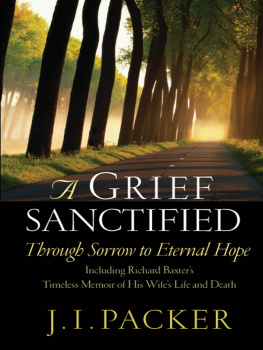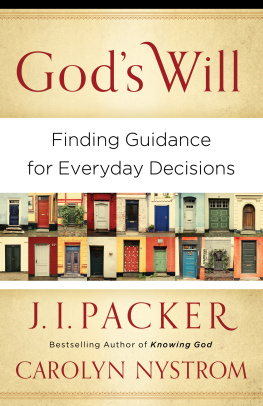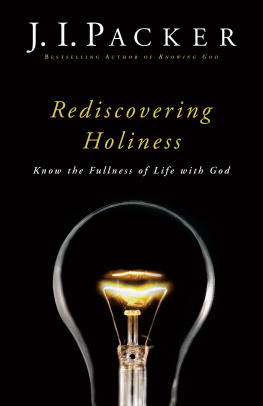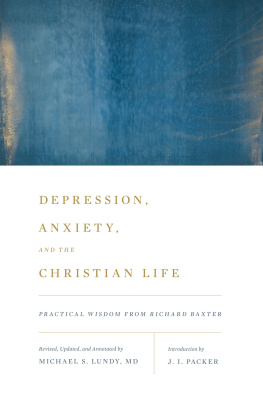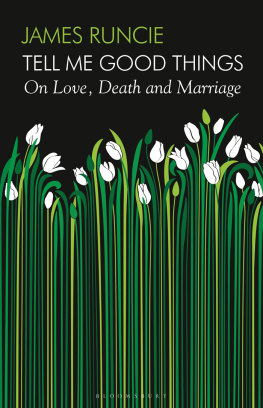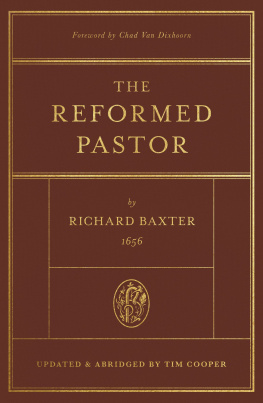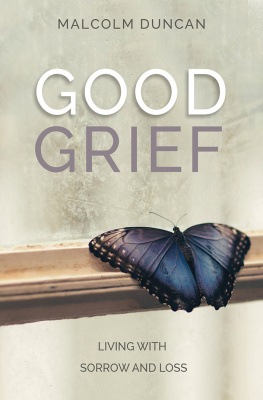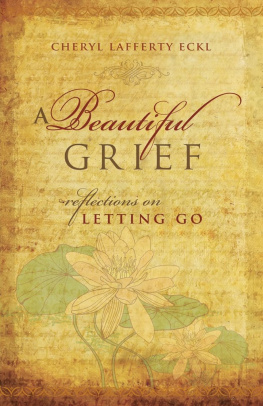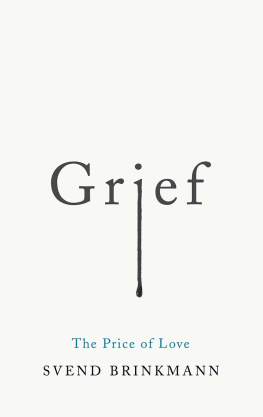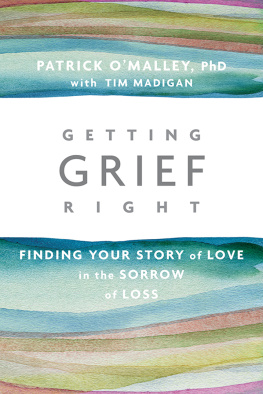A GRIEF SANCTIFIED
Other Crossway books by J. I. Packer
Gods Plans for You
Growing in Christ
Life in the Spirit
A Passion for Faithfulness
A Quest for Godliness
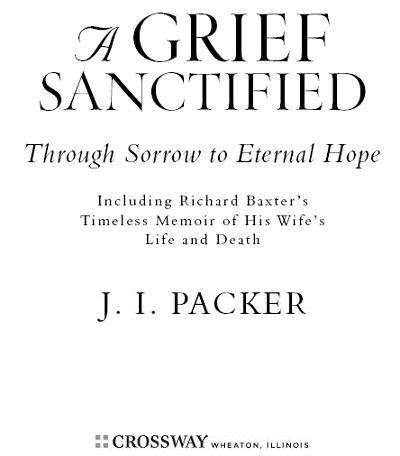
A Grief Sanctified
Copyright 2002 by J. I. Packer
Published by Crossway Books
a publishing ministry of Good News Publishers
1300 Crescent Street
Wheaton, Illinois 60187
Originally published in 1997 by Vine Books, an imprint of Servant Publications.
All rights reserved. No part of this publication may be reproduced, stored in a retrieval system, or transmitted in any form by any means, electronic, mechanical, photocopy, recording, or otherwise, without the prior permission of the publisher, except as provided by USA copyright law.
Cover design: David LaPlaca
Cover photo: GettyOne Images
First printing 2002
Printed in the United States of America

Library of Congress Cataloging-in-Publication Data
Packer, J. I. (James Innell)
A grief sanctified : through sorrow to eternal hope : including Richard Baxters timeless memoir of his wife / J. I. Packer.
p. cm.
Originally published : Ann Arbor, Mich. : Vine Books, c1997.
Includes bibliographical references.
ISBN 1-58134-440-6
1. Baxter, Richard, 1615-1691. Breviate of the life of Margaret, daughter of Francis Charlton... and wife of Richard Baxter. 2. Baxter, Margaret Charlton, 1636-1681. 3. Dissenters, ReligiousEngland Biography. 4. Spouses of clergyEnglandBiography. 5. Baxter, Richard, 1615-1691. 6. PuritansEnglandDoctrinesHistory 17th century. 7. GriefReligious aspectsChristianity.
8. LoveReligious aspectsChristianity. 9. MarriageReligious aspectsChristianity. 10. DeathReligious aspectsChristianity.
I. Baxter, Richard, 1615-1691. Breviate of the life of Margaret, daughter of Francis Charlton... and wife of Richard Baxter. II. Title.
BX5207 .B3 P33 2002
248.8'66'092dc21 2002006708

PG 19 18 17 16 15 14 13 12 11 10 09
15 14 13 12 11 10 9 8 7 6 5 4 3 2
For Monty and Rosemary
and for Kit again
CONTENTS
Grief
This is a book for Christian people about six of lifes realitieslove, faith, death, grief, hope, and patience. Centrally, it is about grief.
What is grief? It can safely be said that everyone who is more than a year old knows something of grief by firsthand experience, but a clinical description will help us to get it in focus. Grief is the inward desolation that follows the losing of something or someone we loveda child, a relative, an actual or anticipated life partner, a pet, a job, ones home, ones hopes, ones health, or whatever.
Loved is the key word here. We lavish care and affection on what we love and those whom we love, and when we lose the beloved, the shock, the hurt, the sense of being hollowed out and crushed, the haunting, taunting memory of better days, the feeling of unreality and weakness and hopelessness, and the lack of power to think and plan for the new situation can be devastating.
Grief may be mild or intense, depending on our own emotional makeup and how deeply we invested ourselves in relating to the lost reality. Ordinarily, the most acute griefs are felt at times of bereavement, when old guilts and neglects come back to mind, and thoughts of what we could and should have done differently and better come hammering at our hearts like battering rams. When Shakespeares Romeo said, He jests at scars, that never felt a wound, he was thinking of the pangs of eros, but his words apply equally to the pangs of grief. Grief is thus, as we say, no laughing matter; in the most profound sense, it is just the reverse.
Bereavement, we saidmeaning the loss through death of someone we lovedbrings grief in its most acute and most disabling form, and coping with such grief is always a struggle. Bereavement becomes a supreme test of the quality of our faith. Faith, as the divine gift of trust in the triune Creator-Redeemer, the Father, the Son, and the Holy Spirit, and so as a habit implanted in the Christian heart, is meant to act as our gyroscopic compass throughout lifes voyage and our stabilizer in lifes storms. However, bereavement shakes unbelievers and believers alike to the foundations of their being, and believers no less than others regularly find that the trauma of living through grief is profound and prolonged. The idea, sometimes voiced, that because Christians know death to be for believers the gate of glory, they will therefore not grieve at times of bereavement is inhuman nonsense.
Grief is the human system reacting to the pain of loss, and as such it is an inescapable reaction. Our part as Christians is not to forbid grief or to pretend it is not there, but to maintain humility and practice doxology as we live through it. Job is our model here. At the news that he had lost all his wealth and that his children were dead, he got up and tore his robe and shaved his head. Then he fell to the ground in worship and said, Naked I came from my mothers womb, and naked I will depart. The LORD gave and the LORD has taken away; may the name of the LORD be praised (Job 1:21 NIV). Managing grief in this way is, however, easier to talk about than to do; we are all bad at it, and for our own times of grieving we need all the help we can get.
At the heart of Richard Baxters grief book is an object lesson in what we may properly call grief management. Here we shall meet a grieving husband memorializing the soul mate whom, after nineteen years of marriage, he had tragically lost less than a month before. Margaret Baxter died at age forty-five after eleven days of delirium, her reason having almost wholly left her, as she had long feared it might do. A starvation diet had weakened her, and the barbarous routine of bloodletting, the universal seventeenth-century remedy for all disorders, had done her the reverse of good. A modern reader might guess that menopausal troubles were involved in her decline, but in her day the medical realities of menopause were unknown country.
Richard, her husband, twenty years older and a knowledgeable amateur physician, thought it was what she took over a period of time for her health (Barnet waters from Barnet spa north of London and too much tincture of amber) that brought on her death.
In 1681, when Richard wrote this Breviate (meaning short account) of Margarets life, he was probably the best known, and certainly the most prolific, of Englands Christian authors. Already in the 1650s, when despite chronic ill health he masterminded a tremendous spiritual surge in his small-town parish of Kidderminster, he had become a best-selling author and had produced enough volumes of doctrine, devotion, and debate to earn himself the nickname Scribbling Dick. Debarred in 1662 from parochial ministry by the unacceptable terms on which the Act of Uniformity reestablished the Church of England, he made writing his main business. By 1680, when he reached sixty-five, he had more than ninety publications to his name.
Then within six months came four bereavements.
In December 1680 our dear friend John Corbet, also an ejected minister and a close comrade of forty years standing, died. Corbet and his wife had lived in the Baxters home from 1670 to 1672. Baxters funeral sermon for Corbet testifies to their affection for each other, as did Margarets immediate persuasion of his widow to move back into the Baxter home on a permanent basis to be her personal companion.
Next page
